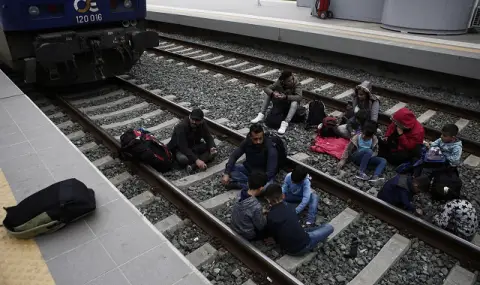Viewed from the Turkish side, the EU and Bulgaria look like a hostile fortress. Those who want to cross the border are met by fences, cameras and violence: "They beat them and take their money", writes the "Süddeutsche Zeitung".
"I don't understand why they do it", told a team of the German "Süddeutsche Zeitung" (ZC) a resident of the village of Smailchevo, located in Turkey, very close to the border with Bulgaria. He is referring to those who are trying to cross over. "They beat them from the other side, but they still try again and again," the man told the German media. He spoke with one of the refugees, who explained to him that he wanted to escape "for freedom". "He wanted to go to Germany - like everyone else," explains the Turkish villager to the ZC.
The man from Smailchevo does not understand it. Clearly - freedom, but at what cost? Refugees usually arrive by taxi from the nearby city of Edirne, then make their way to the fence - with steel shears and ladders. However, some return and take a taxi back to Edirne.
"Earlier, people from over there wanted to come here, now it's the other way around"
Smailchevo (or in Turkish: Buyukismailce) is a closed place. For local people beyond the village, the world is ending, former mayor Emin Bey explained to ZC. Earlier, it was the first village in the NATO country Turkey, after which the Eastern Bloc began. "How strange - earlier people wanted to cross the border and come to us, now it's the other way around,", Bey points out.
At the same time, the former mayor points out that "from the other side" it is no longer just Bulgaria - there is the European Union. But viewed from Smailchevo, it looks like a hostile fortress. Because the border is equipped with movement sensors, with thermal cameras, parts of the Bulgarian border guard and the European border agency Frontex, notes the Central Committee. Even German Interior Minister Nancy Feser recently visited the Bulgarian-Turkish border and praised the "reinforced protection of the external borders" of the EU.
Prosecution under the expedited procedure
The German edition notes that Europe's goal is to make every single external border resemble the one between Turkey, Bulgaria and Greece - i.e. almost no one can pass through it. If someone does succeed, they are already faced with a new procedure. The fate of these people must be decided already in the camps, near the border.
For those who have almost no chance of being granted the right to stay, a fast-track procedure is provided. It was introduced in Bulgaria in 2023, and in most cases ends with a negative decision. And the person affected must be extradited, and quickly. The reform aims to repel migrants - as told by the people of the Turkish border villages. Both Bulgarian and Greek border police are returning more and more people back to Turkey. As very often, these are illegal extraditions without procedure, without legal basis, often accompanied by violence, although the governments in Sofia and Athens deny this, writes ZC.
In his article "De Zeit" cites the following figures: last year, according to its data, the Bulgarian border police "prevented" 180,000 illegal attempts to cross the border by people who then again "voluntarily"' had returned to Turkey.
Fighting, rape and other horrors
ZC quotes the former mayor of the Turkish border village Emin Bey, who tells about Syrian women who were raped. "They were bleeding." And by whom were they raped - by the Bulgarian police, the German journalists ask. Bey nods in the affirmative - as if if this is indeed the case, it would not be a surprise, notes the publication.
People from the village and the entire area around Edirne also share more horrifying stories: "They are hissing the dogs against them. They beat them, take their money and clothes, after which the refugees return in blood". The Greeks were particularly cruel, the residents of the village of Smailchevo told the ZC, according to whom the Greeks did not even let a chicken fall over.
"The police punish those who need protection," says 40-year-old Hamid Hosh Siyar. He is an Iranian physicist, and today he lives in Harmanli, where he works in the "Mission Krile" foundation, which helps refugees. When Hamid arrived in Bulgaria four years ago, the police beat him with the cane he was carrying, then took him to a closed camp. He was subsequently granted asylum as he was imprisoned in Tehran. Today, it would probably be more difficult for him in Bulgaria - as an Iranian, he will go through the fast procedure, i.e. he will most likely be extradited.
"De Zeit" notes that the refugees arriving in Bulgaria are no longer as many as in 2023 - thanks to the fence and the efforts made by the Turkish police.
"However, the politicians will not be able to stop the people", Hamid Hosh Siyar believes. "They can make it difficult for them, but that won't stop them," he is convinced. Even if the refugees have to choose increasingly dangerous routes.
